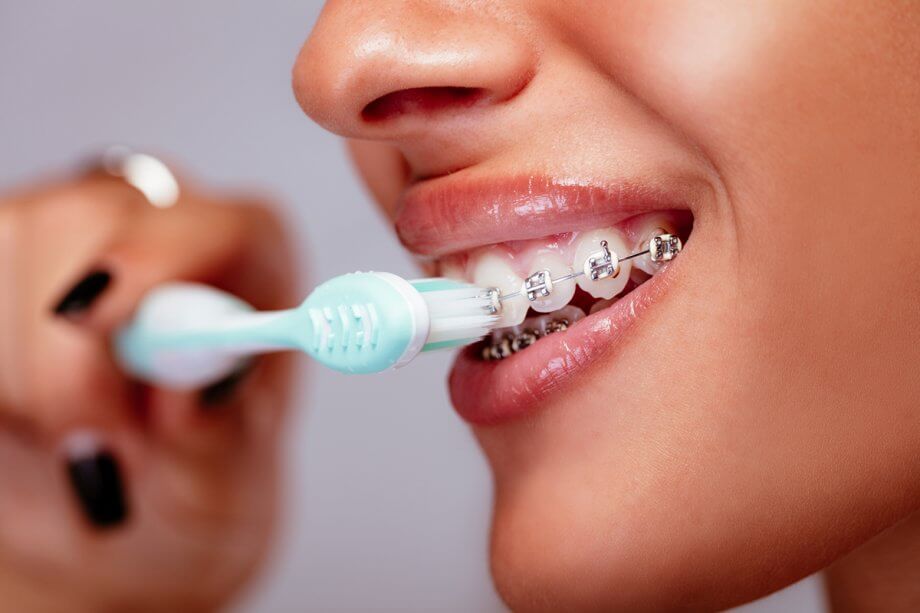When you have braces, the simple task of tooth brushing becomes a challenge. Many children and adults with braces have difficulty keeping their teeth clean, leading to oral hygiene problems like bad breath, tooth decay, and gum disease.
Wearing braces does not need to endanger your oral health. Paying close attention to your brushing technique can improve oral health and protect your smile for a lifetime. This blog provides step-by-step brushing and flossing instructions for braces patients and advises on the necessary equipment.
Set a Solid Routine
Every patient needs to brush and floss with care, but braces patients must pay extra attention to these routine tasks. When braces make brushing and flossing challenging, food particles and plaque can build up on teeth. Plaque excretes bacterial waste products that damage the enamel, gums, and underlying bone. If plaque remains on teeth, your tooth decay and gum disease risk increases.
Set aside consistent times to brush and floss your teeth. Ideally, braces patients should brush at least three times each day. Brush upon waking, every time you eat a meal or snack, and before you go to bed.
Choose the Right Equipment
Toothbrush
Choose a soft toothbrush when you have braces. If you use a stiff toothbrush, you risk damaging your gums, which may already be tender.
Toothpaste
Use approved fluoride toothpaste. Do not use whitening toothpaste since the braces are in the way, and your teeth may show uneven coloration.
Interdental Brush
Use an interdental or interproximal brush to reach plaque and food around and under your brackets and wires. These brushes are easy to find at the pharmacy or supermarket.
Brushing Instructions
Before you begin, rinse your mouth with water. This step will help loosen food and plaque.
Carefully hold your toothbrush at a 45-degree angle to your gums. Brush gently using a circular motion, avoiding putting too much pressure on the gums. Brush the top of the brackets and ensure you brush where the upper teeth meet the gums.
Brush the tops of your brackets by holding your brush downward. Brush the bottoms of our brackets by keeping the bristles pointing up at an angle.
Continue brushing for a full five minutes, covering every surface. Set a timer to ensure you brush long enough.
Flossing Instructions
Flossing around orthodontic braces can challenge young patients, but parents must ensure they do not skip this step. Parents should help their children floss if they have issues completing the task independently.
Use a plastic floss threader to guide the floss behind the wires to reach your teeth and gums. You can find floss threaders at the pharmacy in the oral care section. Many braces patients also have good luck with electric water flossers.
Benefits of Proper Oral Care for Braces Patients
Prevent Tooth Decay
While orthodontic appliances can benefit oral health in the long run, patients who neglect brushing and flossing could encounter severe tooth decay.
Poor brushing and flossing habits lead to chronic issues. Patients may experience decay around their braces, leading to root canals, abscesses, and tooth loss in the future.
Prevent Gum Disease
Braces patients are more prone to gum disease because removing plaque and tartar can be problematic. If gum disease persists, it can become severe, and there is a high risk of tooth loss later in life.
Brighter Teeth
Teeth become yellow and discolored if patients do not keep them clean. Teeth may look stained or unevenly colored if patients neglect oral hygiene.
Better Breath
Plaque and food particles that may collect around braces cause persistent bad breath, which can affect a patient's self-confidence and social life.
Frequently Asked Questions About Braces
How long do metal braces take?
On average, metal braces take about 12 to 18 months, though depending on your tooth alignment issues, you may experience shorter or longer treatment times.
What is the best age for metal braces?
Most orthodontists recommend starting braces treatment at about age 10 to 12. By this time, children have most or all of their permanent teeth. However, older patients can receive successful treatment with braces at any point in their lives.
Contact Tender Smiles 4 Kids
If you or your child has braces, we can provide additional care tips to keep teeth healthy and bright. Please contact us at one of our Central Jersey offices in Freehold, North Brunswick, Edison, Roselle, or Ocean.

